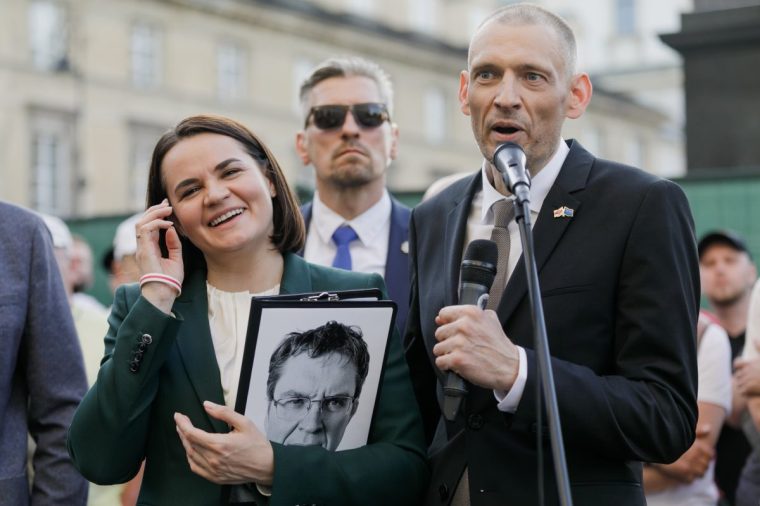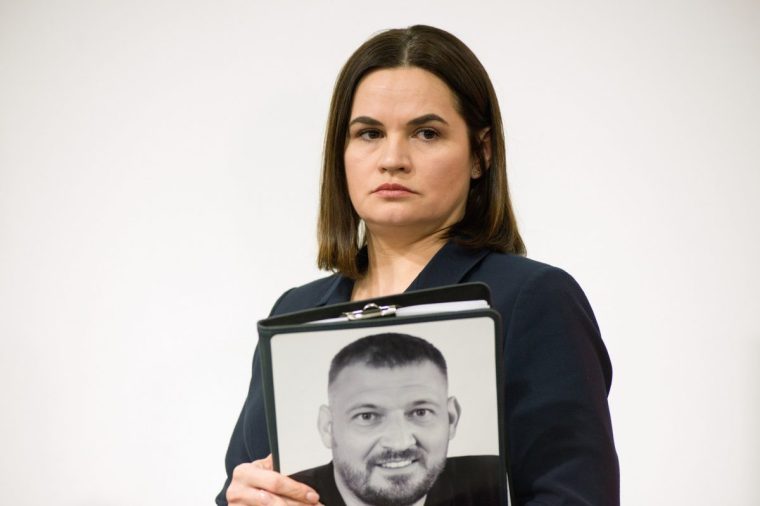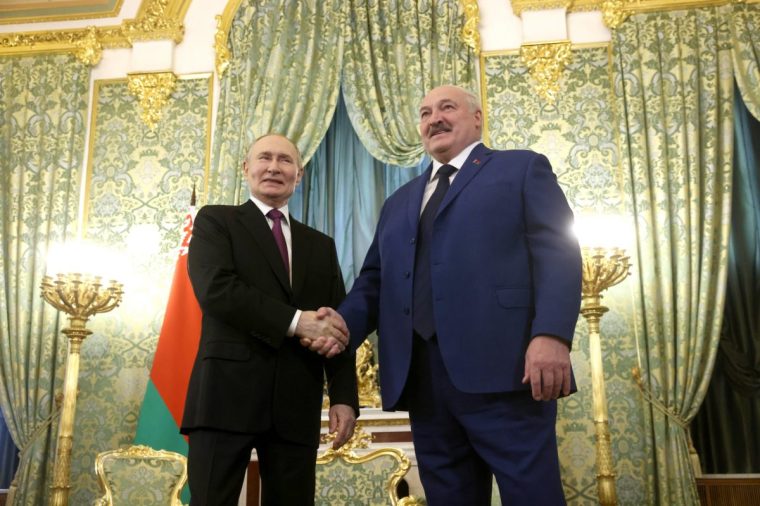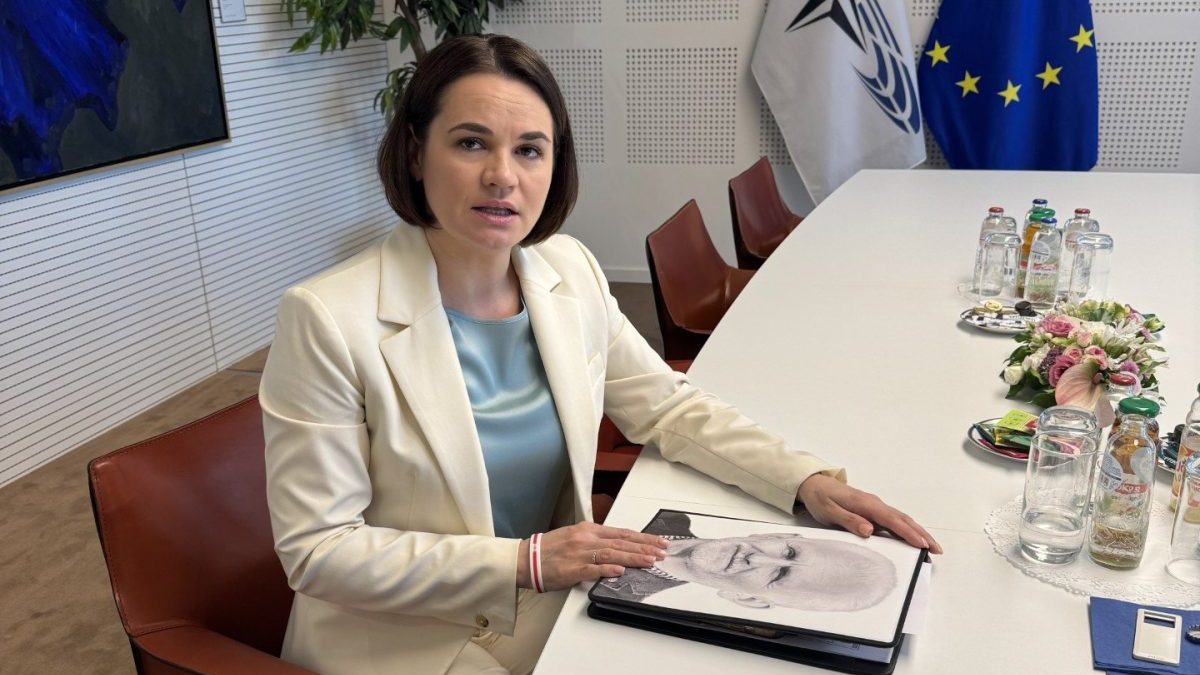Sviatlana Tsikhanouskaya warns the West not to be taken in by the Belarussian dictator after he freed her husband in a prisoner swap last month
BRUSSELS – For almost five years, Sviatlana Tsikhanouskaya campaigned across Europe not just as Belarus’s exiled opposition leader, but as a wife. Her husband, Siarhei Tsikhanouski, was imprisoned for daring to challenge Alexander Lukashenko’s dictatorship. Now, in an unexpected turn, he is finally free.
“I only knew my husband was released when he called me from the border,” Tsikhanouskaya, 42, says, still sounding stunned by the suddenness of it all. “‘My dear wife, I’m free,’ he said. It didn’t feel real.”
We meet in Brussels just weeks after Siarhei’s surprise release as part of a rare prisoner deal with the Lukashenko regime. Tsikhanouskaya, Belarus’s exiled opposition leader, who is widely regarded as the true winner of the rigged 2020 election, is in town to remind Nato figures and EU leaders that Belarus – squeezed between Russian imperial ambitions and Western inattention – still matters.
“It was a mess of emotions,” the mother of two recalls of that first call from her husband. “I was shaking. I went home and told my son, who is 15, that his dad would be coming home. And when I finally saw him…he looked like a skeleton.”
Five years in a Belarusian prison left physical and emotional scars on Siarhei, a former video blogger whose candid online critiques of the regime first sparked national protests. “I couldn’t imagine that he could lose half of his weight. Honestly, if I had crossed him on the street, I would not have recognised him,” she says.
 Tsikhanouskaya listens to a speech by her husband, former political prisoner Siarhei Tsikhanouski, during their first joint public meeting with the Belarusian diaspora in Warsaw after his release (Photo: Volha Shukaila/Sopa Images/LightRocket via Getty)
Tsikhanouskaya listens to a speech by her husband, former political prisoner Siarhei Tsikhanouski, during their first joint public meeting with the Belarusian diaspora in Warsaw after his release (Photo: Volha Shukaila/Sopa Images/LightRocket via Getty)
Their daughter, who was four when he was jailed, did not recognise him. “She looked him straight in the face and said: ‘Hello, who are you?’” Tsikhanouskaya says, wincing. “Only when he spoke, did she realise – because all those years, we had watched videos – so she knew his voice. She ran and hugged him. She has spent more of her life without her daddy than with him.”
It should be a moment of private joy – a family reuniting against the odds. But for Tsikhanouskaya, as a public opposition figure, joy remains complicated. “Maybe I am a bad wife,” she smirks, half-apologetically. “A good wife would stay at home. But this is a very important political moment.”
Her husband, too, has thrown himself into political life. “He has so many stories to tell. He wants to shout to the world about what’s happening in Belarus. He jumped into activities, started to communicate to people constantly.” During his imprisonment, Russia invaded Ukraine, launching incursions from Belarus. Tsikhanouski was, however, kept “incommunicado,” in complete isolation for much of that time – and for the past two years, Tsikhanouskaya did not know for certain if he was even alive.
Tsikhanouskaya is no longer the quiet English teacher thrust reluctantly into the spotlight after her husband’s arrest in 2020. In exile, she has matured into a figure of moral clarity – equal parts campaigner, diplomat and caretaker of a fractured nation’s hopes.
“I showed myself more as a politician than a wife,” she says. “He is physically exhausted. He needs time to understand what’s happened. We complement each other. He jokes that I’m the President-Elect, so he must be the First Gentleman.”
 Tsikhanouskaya holds a portrait of her husband during his imprisonment (Photo: Attila Husejnow/SOPA Images/LightRocket via Getty)
Tsikhanouskaya holds a portrait of her husband during his imprisonment (Photo: Attila Husejnow/SOPA Images/LightRocket via Getty)
There is no real power in exile. Yet Tsikhanouskaya has helped build what she calls “alternative institutions of power” – a shadow government, a network of Belarusian diplomats-in-exile, and an international awareness campaign that, remarkably, has kept Belarus on the agenda through war, pandemic and political fatigue.
But keeping Belarus in the headlines is no small task. The EU and Nato are fixated on Ukraine, Gaza and Donald Trump’s return to the US presidency. The Belarusian people’s sacrifice risks becoming a footnote to the larger contest between Vladimir Putin and the West over the fate of Ukraine. “I fear that Belarus could be a consolation prize in a peace deal,” Tsikhanouskaya warns.
In January, Belarus held presidential elections, in which Lukashenko was declared the winner with 86.8 per cent of the vote, against a single opponent, at 3.2 per cent. Britain, the EU, Australia, Canada and New Zealand condemned “the sham presidential elections in Belarus and the ongoing human rights violations perpetrated by the Belarusian regime”, adding: “We stand with the Belarusian people and recognise their right to determine their own future in a genuinely free and fair manner, without fear, oppression or external interference.”
Tsikhanouskaya is unsparing in her assessment of the man who seized control in Belarus in 1994, when she was 11, and still clings to power. “Lukashenko’s rule is like a sandcastle. One storm and it will collapse,” she says. Other seemingly impregnable Russian-backed tyrants have fallen fast, she notes, pointing to how Bashar al-Assad’s regime in Syria collapsed in days last December. “Lukashenko is a puppet of Putin, pushing Belarus back into a Soviet-style period. Without Putin, Lukashenko would not survive politically for a day,” she says.
 Russian President Vladimir Putin greets Belarusian President Alexander Lukashenko at the Grand Kremlin Palace in Moscow in March (Photo: Contributor/Getty)
Russian President Vladimir Putin greets Belarusian President Alexander Lukashenko at the Grand Kremlin Palace in Moscow in March (Photo: Contributor/Getty)
She lists the regime’s crimes: “Oppression of Belarusians, the weaponisation of migration, hijacking of an international plane, involving our country in war.”
The recent prisoner release, she says, is not a signal of change, but a cynical calculation. “He’s very sly. He wants to get out of isolation, to make himself seem acceptable. But for every prisoner released, another is arrested. Europe should not change policy. Do not make deals with Lukashenko. He is illegitimate,” she says.
The danger, she argues, is that Western governments interpret small signs of moderation as reform. Her husband was released after Trump officials put pressure on Lukashenko, which she is grateful for – but not if it means ignoring the wider issues.
“We must not normalise the trafficking of political prisoners, when people are released in return for concessions from your side,” she says. “I already hear some say: ‘He released 14 people, maybe he’s changing.’ No. The changes we want must be systematic. The sanctions, the pressure – they must continue. There are still over 1,250 political prisoners in prison in Belarus.”
With war grinding on in Ukraine, Tsikhanouskaya is urging Western leaders not to forget how the fate of Belarus is bound to Kyiv’s. “If Ukraine loses, Belarus will be trapped in a Stalin prison for decades,” she says. “But if Ukraine wins, it’s a window of opportunity. A weakened Putin means a weakened Lukashenko.”
She fears that in future peace talks, Belarus might be seen as peripheral. “We encourage all our partners to put Belarus on the table, alongside Ukraine. Don’t overlook us.”
For her, the work is far from over. “There will be no peace, no security in Europe until Lukashenko is gone. So invest in people, in countries like ours, part of this European family of nations.”
She does not expect the struggle to end soon. But towards the end of our conversation, Tsikhanouskaya says: “When people say: ‘You’re not alone, you’re not abandoned,’ that gives us the strength to keep going.”
